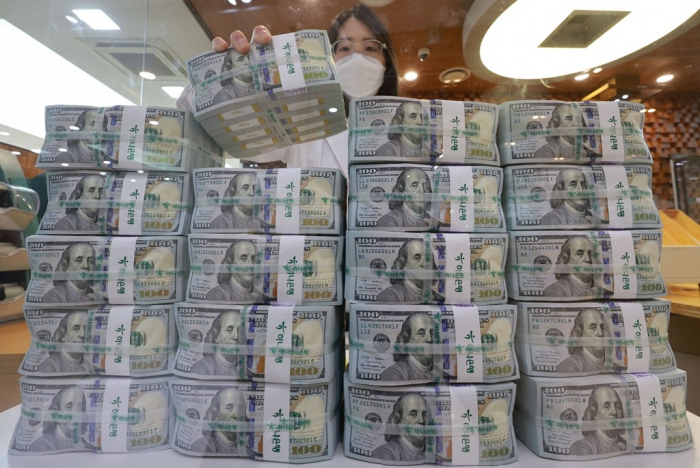Foreign exchange
Korean won falls on firm US jobs data, new BOJ head report
The Kospi slides 1.7% as foreign investors turn net sellers after buying in the previous three consecutive sessions
By Feb 06, 2023 (Gmt+09:00)
2
Min read
Most Read
LG Chem to sell water filter business to Glenwood PE for $692 million


Kyobo Life poised to buy Japan’s SBI Group-owned savings bank


KT&G eyes overseas M&A after rejecting activist fund's offer


StockX in merger talks with Naver’s online reseller Kream


Mirae Asset to be named Korea Post’s core real estate fund operator



The South Korean won currency skidded to a four-week low on Monday as stronger-than-expected US employment data renewed expectations that the Federal Reserve may remain hawkish for longer than recently expected while a media report on a new Japanese central bank chief hurt the yen.
The won lost as much as 1.9% to 1,253.5 per dollar, its weakest since Jan. 9, in the local foreign exchange market.
“The US data confused investors, who had expected the dollar’s weakness,” said Moon Hong-cheol, an economist at DB Financial Investment in Seoul, adding the won is unlikely to strengthen further in the near term. The South Korean currency has appreciated 0.9% versus the US unit so far this year.
The US Labor Department data on Feb. 3 showed that nonfarm payrolls jumped by 517,000 jobs last month. Economists in a Bloomberg poll had forecast a gain of 188,000, while analysts in a Reuters survey had expected an increase of 185,000.
In addition, the unemployment rate fell to a near 54-year low of 3.4%.
Such strong figures rekindled predictions that the Fed may resume aggressive tightening, broadly powering the dollar. That also dampened risky assets including South Kora’s stock markets. The main Kospi lost 1.7% as foreigners sold a net 288.5 billion won ($230.4 million) in the main bourse after buying a combined net 1.4 trillion won in the previous three straight sessions.
Investors had raised bets on the end of the US central bank’s interest rate hike campaign in the near term since Fed Chairman Jerome Powell acknowledged deflationary pressure last week when the monetary authority ramped up its policy rate by a quarter of a percentage point, marking its eighth increase.
DOVISH BOJ GOVERNOR REPORT
The won tracked the Japanese yen’s weakness after a media report that the country is set to appoint a dovish central bank chief.
The government has approached Bank of Japan Deputy Governor Masayoshi Amamiya as a possible successor to the current head Haruhiko Kuroda, the Nikkei newspaper reported, citing anonymous sources. The 67-year-old career central banker is the architect of most BOJ policies under Kuroda, the newspaper said.
Amamiya, known as the most dovish policymaker among contenders, is expected to keep the BOJ’s loose monetary policy, putting pressure on the yen, analysts said.
That may boost the dollar further broadly, hurting the South Korean won, they added.
Meanwhile, South Korea and Australia renewed their currency swap deal to promote bilateral trade for the economic development of both countries and ensure financial market stability.
The renewed five-year agreement allows the exchange of local currencies between the Bank of Kora and the Reserve Bank of Australia of up to 9.6 trillion won or A$12 billion ($8.3 billion), according to the two central banks.
Write to Mi-Hyun Jo at mwise@hankyung.com
Jongwoo Cheon edited this article.
More to Read
-
 Korean stock marketForeigners turn net buyers of Korean stocks as China reopens borders
Korean stock marketForeigners turn net buyers of Korean stocks as China reopens bordersJan 12, 2023 (Gmt+09:00)
2 Min read -

Comment 0
LOG IN


